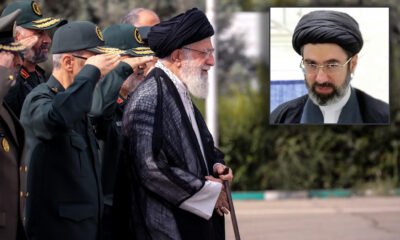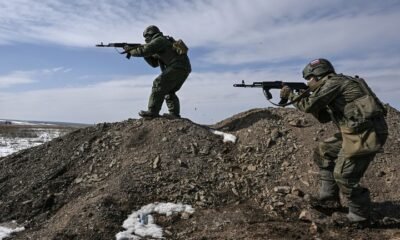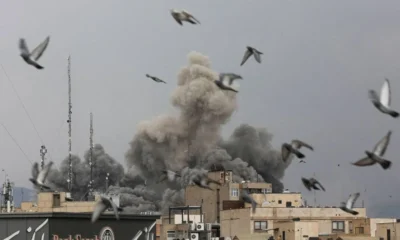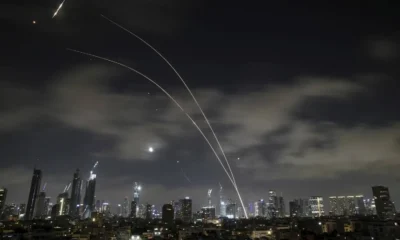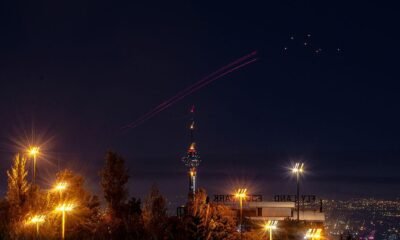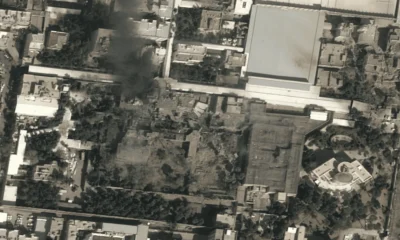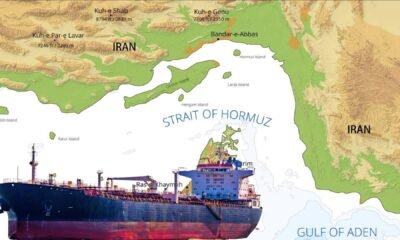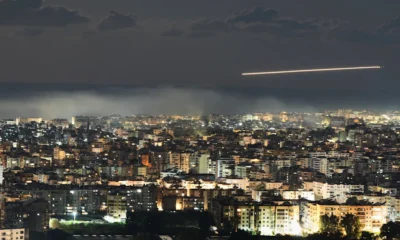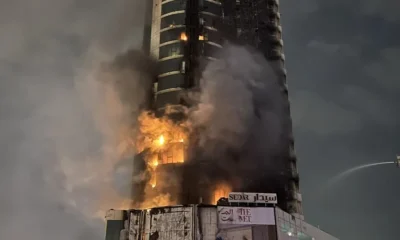Middle East
Israel’s Secret Red Button Plan Strikes Hezbollah with Devastating Precision

In the covert world of intelligence and warfare, where strategy and timing are everything, Israel has just unleashed a chilling new weapon in its arsenal—a device so secretive and lethal it’s known only as the “Red Button.” This mysterious operation, designed to strike at precisely the right moment, has sent shockwaves through the region, leaving Hezbollah scrambling and the world wondering just how far Israel is willing to go.
Last week, a series of explosive device blasts rocked Lebanon, causing devastating casualties within Hezbollah’s ranks. But this wasn’t just another skirmish in the long-running conflict. No, this was something far more calculated—a move Israel had been preparing for years as part of a larger, shadowy plan to cripple its most formidable adversary.
Behind the scenes, Israeli officials are calling this their “red button capability.” The term alone sparks curiosity, conjuring images of a secret weapon that can be activated with ruthless precision at the touch of a button—whenever Israel deems the moment critical. According to former Israeli intelligence officers, this recent strike is part of a long-term strategy, carefully crafted to deal maximum damage when the stakes are highest.
But what’s the real story behind these blasts? And why now?
It turns out, this attack wasn’t even part of Israel’s original grand plan. The operation—while devastating to Hezbollah—was improvised at the last moment. “This wasn’t part of the comprehensive plan we had envisioned,” one former Israeli official revealed. The timing, it seems, remains a mystery, but the results? Absolutely undeniable. Hezbollah is now reeling, and its command structure has taken a severe blow, leaving its leader, Hasan Nasrallah, desperately trying to regroup.
Yet, there’s much more lurking beneath the surface.
A Multi-Year Operation of Espionage and Sabotage
Long before those explosive devices detonated, Israel had already woven an intricate web around Hezbollah. According to insiders, this operation was years in the making. Israel’s legendary intelligence agency, Mossad, meticulously mapped out Hezbollah’s entire logistics and procurement network—down to the shell companies they use, the hidden contacts, and the weak points that could be exploited.
This wasn’t just about bombs. It was about penetration—of communications, of supply chains, of Hezbollah’s very core.
One former Israeli intelligence official, who spoke under strict anonymity, revealed that Mossad had built a mirror network of companies that could get Israel closer to Hezbollah’s operations. “They had no idea how close we were,” the official boasted, describing how Israel’s agents moved within Hezbollah’s own supply chains, inching ever closer to their targets while maintaining perfect cover.
The payoff? When the time was right, Israel flipped the switch—literally—and turned their intimate knowledge of Hezbollah into a deadly trap.
Criticism from the West: Tactical Genius or Reckless Gamble?
While Israel celebrates the success of the strike, not everyone is impressed. In the U.S., some intelligence officials are still reeling from the news, piecing together how such an audacious operation could have unfolded without their knowledge.
One former U.S. intelligence officer criticized Israel’s decision to rig the devices with explosives instead of more sophisticated espionage tools, calling it a reckless display of “kinetic power” that might not serve Israel’s long-term goals. “If we had known, we would’ve freaked out,” one official candidly admitted, adding that they would have pulled every diplomatic lever to stop Israel from going ahead with the operation.
But back in Israel, the mood is one of triumph. Eyal Pinko, a former Israeli naval commander and intelligence officer, insists that the operation struck at the heart of Hezbollah’s command and control. “This will take Hezbollah off-balance for a long time,” Pinko said, underscoring the disruption the explosions caused within the terror group’s leadership.
For Israel, the question of “when” to push the red button has always been the most critical one. Now that it’s been pushed, the aftermath is chaos—for Hezbollah, for Lebanon, and for Israel’s enemies across the region.
What Comes Next?
As the dust settles from this explosive attack, the stakes in the Middle East have never been higher. Israel’s bold strike has shown the world that it’s not afraid to use its secret arsenal when it deems necessary. Hezbollah, reeling from the blow, will no doubt be plotting its next move. But the question remains: How much damage has been done? And will Israel push the red button again?
One thing is certain: This operation wasn’t just about bombs—it was about sending a message. A message to Hezbollah, to Iran, and to the entire world. Israel will strike when it wants, where it wants, and it will leave no stone unturned in its mission to protect its borders and eliminate its threats.
As tensions continue to rise in one of the most volatile regions on the planet. And as Israel’s “Red Button” looms ominously over future conflicts, the next time it’s pushed could reshape the entire balance of power in the Middle East.
Middle East
US Escalates Deeper Into Iran as Missile Fire Slows

Pentagon Says Tehran’s Launches Are Declining While American Strikes Push Further Inland.
Fewer Iranian missiles — but a wider American war. Is this the turning point or the next phase?
The United States signaled a new phase in its war with Iran on Wednesday, saying Iranian missile launches have declined sharply since the opening salvos of the conflict — even as Washington prepares to expand its campaign deeper into Iranian territory.
General Dan Caine, chairman of the Joint Chiefs of Staff, told reporters at the Pentagon that Iran’s military capabilities have been “greatly diminished,” pointing to a drop in missile fire compared with the first days of fighting.
“We will now begin to expand inland, striking progressively deeper into Iranian territory and creating additional freedom of maneuver for US forces,” Caine said.
The comments suggest the U.S. believes it has degraded enough of Iran’s air defenses and launch infrastructure to operate with greater latitude — a significant shift from the early phase of the conflict, when Iranian barrages targeted U.S. bases and regional cities.
Defense Secretary Pete Hegseth struck a confident tone, declaring that the United States was “winning” the war, even as he confirmed that six American service members have been killed since hostilities began.
“We will outlast Iran,” Hegseth said.
In a notable escalation at sea, Hegseth confirmed that a U.S. submarine sank an Iranian warship off the coast of Sri Lanka — the first sinking of an enemy vessel by torpedo since World War II.
“An American submarine sunk an Iranian warship that thought it was safe in international waters,” Hegseth said. “Instead, it was sunk by a torpedo. Quiet death.”
The incident marks a dramatic expansion of the conflict beyond the Persian Gulf, underscoring the global dimensions of the confrontation.
Analysts caution that a reduction in Iranian missile fire does not necessarily signal exhaustion. Tehran may be conserving inventory, recalibrating targets, or shifting toward asymmetric tactics — including maritime disruption or proxy operations.
For Washington, however, the message is clear: momentum appears to be shifting. By pushing strikes inland, the United States is betting that sustained pressure will further erode Iran’s command structure, logistics networks and remaining launch capabilities.
Whether that strategy compels Tehran to negotiate — or provokes a new and unpredictable phase — may determine how long this widening war endures.
Middle East
Mojtaba Khamenei Chosen as Supreme Leader
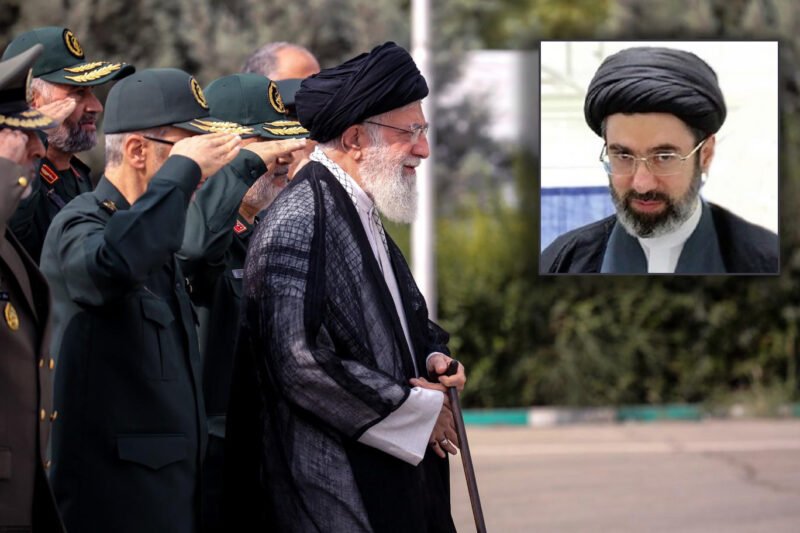
Assembly of Experts Said to Select Ayatollah Khamenei’s Son Amid Reported Pressure from Revolutionary Guard.
From “gatekeeper” to supreme leader? Iran may be entering its most controversial transition yet.
Iran’s powerful Assembly of Experts has reportedly selected Mojtaba Khamenei, the son of slain Supreme Leader Ayatollah Ali Khamenei, as the next leader of the Islamic Republic, according to Iran International, which cited sources familiar with the decision. The reported vote was said to have taken place under pressure from the Islamic Revolutionary Guard Corps (IRGC).
Senior Israeli officials said they expect a formal announcement in the coming hours. Iranian state media, however, had not confirmed the decision at the time of reporting.
The development follows the killing of Ayatollah Ali Khamenei at the outset of Israel’s Operation Roaring Lion. Iranian media reported earlier Tuesday that members of the 88-member Assembly were not inside the Qom building targeted by Israeli strikes and would soon announce a successor.
If confirmed, the elevation of Mojtaba Khamenei would mark one of the most consequential and controversial leadership transitions since the 1979 revolution.
A Contested Succession
Mojtaba Khamenei, the supreme leader’s second son, is widely viewed as aligned with Iran’s hardline conservative establishment. A mid-ranking cleric who teaches Shiite theology in Qom, he has never held formal government office but is believed to have exercised considerable influence behind the scenes, particularly through close ties with the IRGC.
Outside analysts have long described him as a key “gatekeeper” within his father’s inner circle. In 2019, the United States imposed sanctions on him, arguing that he effectively represented the authority of the supreme leader despite lacking an official title.
Yet his candidacy has historically been controversial. Critics have warned that elevating him could be perceived as a hereditary transfer of power — an uncomfortable echo of the monarchy overthrown in 1979. Others have questioned whether he possesses the senior clerical standing traditionally expected for the role.
The Constitutional Framework
Under Iran’s constitution, the supreme leader is selected by the Assembly of Experts, whose members are elected but vetted by the Guardian Council — itself appointed directly or indirectly by the supreme leader. The position wields ultimate authority over the armed forces, judiciary and key state institutions.
If Mojtaba Khamenei’s selection is confirmed, it would signal not only continuity in ideological direction but also the decisive influence of the security establishment at a moment of acute national crisis.
Whether this transition consolidates power — or deepens internal tensions — may soon become clear.
Analysis
Iran War’s Hidden Front: What It Means for Ukraine

From Oil Prices to Missile Stockpiles, the US-Iran Conflict Could Reshape the Battlefield in Eastern Europe.
If Washington is tied down in Tehran, what happens in Kyiv?
The widening war between the United States, Israel and Iran may appear geographically distant from Ukraine. Strategically, it is anything but. The trajectory of the Iran conflict — whether swift resolution, grinding stalemate or strategic overreach — carries direct consequences for Kyiv’s military position and political confidence.
Three broad scenarios stand out.
A quick U.S. success
If Washington forces Tehran into rapid concessions or regime restructuring, the immediate signal would be one of restored American deterrence. That could embolden U.S. policymakers elsewhere, reinforcing perceptions that American power remains decisive despite years of strain.
For Ukraine, such an outcome would likely lift morale and strengthen expectations of sustained Western backing. A demonstration of U.S. military effectiveness could reinforce confidence in Washington’s capacity to sustain pressure on Moscow.
However, there would also be economic consequences. A swift de-escalation in the Gulf would likely push oil prices lower, reducing revenue for Russia — a financial setback for the Kremlin’s war effort.
A prolonged war of attrition
A drawn-out conflict in the Persian Gulf would create a very different dynamic. Sustained missile exchanges and naval operations would consume large volumes of precision-guided munitions and air-defense interceptors — the same categories of equipment Ukraine relies on.
The U.S. and its NATO partners already face production constraints in replenishing advanced missile systems. If inventories are redirected to protect Gulf bases and allies, deliveries to Kyiv could slow further.
At the same time, prolonged instability would likely keep oil prices elevated, bolstering Russian export revenues. Higher energy income would provide Moscow with additional fiscal breathing room as it sustains operations in Ukraine.
Politically, global attention would drift. A major Middle Eastern war inevitably competes for diplomatic bandwidth, media focus and legislative funding priorities in Washington.
A stalemate
Perhaps the most complex outcome is an inconclusive standoff — one in which Washington scales back operations without achieving decisive change in Tehran.
Such a scenario could dent perceptions of U.S. leverage. For Kyiv, which depends heavily on American military and financial support, doubts about U.S. resolve or capacity would be unsettling.
At the same time, missile stockpile depletion in a stalemate scenario would still constrain Western resupply to Ukraine, regardless of political messaging.
The broader pattern is clear: the Iran war stretches U.S. resources across multiple theaters. Every interceptor launched over the Gulf is one less available elsewhere. Every additional deployment complicates long-term planning.
For Moscow, distraction and resource dilution are strategic advantages. For Kyiv, sustained focus and material flow are existential necessities.
The coming weeks in the Gulf will therefore resonate far beyond Tehran. In modern great-power competition, conflicts are rarely isolated. They overlap, interact and amplify each other — and Ukraine may soon feel the consequences of a war fought hundreds of miles away.
Middle East
$35,000 Drone Enters War: Pentagon Fast-Tracks New Suicide System
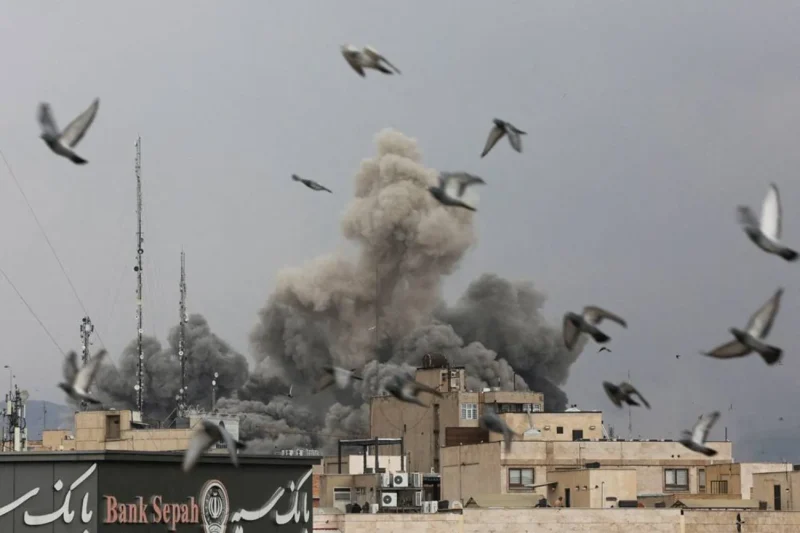
Cheap, fast, expendable — has the Pentagon finally embraced attrition warfare?
The United States has deployed its new Low-Cost Uncrewed Combat Attack System, or LUCAS, in combat operations against Iran — just eight months after the system was unveiled at the Pentagon.
The drone, manufactured by Arizona-based SpektreWorks, was first showcased in July 2025 during a Pentagon demonstration led by Defense Secretary Pete Hegseth. Its battlefield debut marks a dramatic break from traditional defense acquisition cycles, which often stretch across years or even decades.
At roughly $35,000 per unit, LUCAS represents a sharp pivot toward attritable systems designed for high-volume deployment. By comparison, an MQ-9 Reaper costs between $20 million and $40 million and is intended to be reused. LUCAS, by contrast, is designed to be expendable.
U.S. Central Command said the drone’s design is modeled in part on Iran’s Shahed-136 loitering munition — a system widely used by Russia in Ukraine. The emergence of Shahed-style drones has reshaped modern conflict by enabling massed, low-cost strikes capable of overwhelming expensive air defense systems.
LUCAS uses an open architecture, allowing operators to swap payloads and communications systems depending on mission needs. It can be launched from ground platforms or vehicles and configured for strike or target-drone roles. The U.S. government owns the intellectual property, enabling potential production by multiple manufacturers, though SpektreWorks currently holds contracts.
Its rapid deployment reflects lessons drawn from Ukraine, where thousands of inexpensive drones have altered the cost equation of warfare. Pentagon officials say the system aligns with the $1 billion Drone Dominance Program authorized under the “One Big Beautiful Bill Act of 2025,” aimed at scaling U.S. production of low-cost autonomous weapons.
During development, LUCAS reportedly integrated satellite connectivity systems including Starlink, Starshield and Viasat’s MUSIC, though current operational configurations have not been disclosed. Control software enabling operators to manage multiple autonomous drones simultaneously was developed by startup Noda.
Defense analysts note that LUCAS resembles a lineage of loitering munitions that stretches back decades, including Israel’s Harpy anti-radar drone and earlier U.S. concepts from the Cold War era.
The system’s combat debut underscores a broader shift in U.S. military doctrine: speed over perfection, scale over exclusivity, and affordability over singular technological dominance.
In an era where adversaries can field swarms of inexpensive drones, the Pentagon appears to be embracing a simple reality — attrition has returned to center stage.
Middle East
US Embassy in Riyadh Targeted by Drones
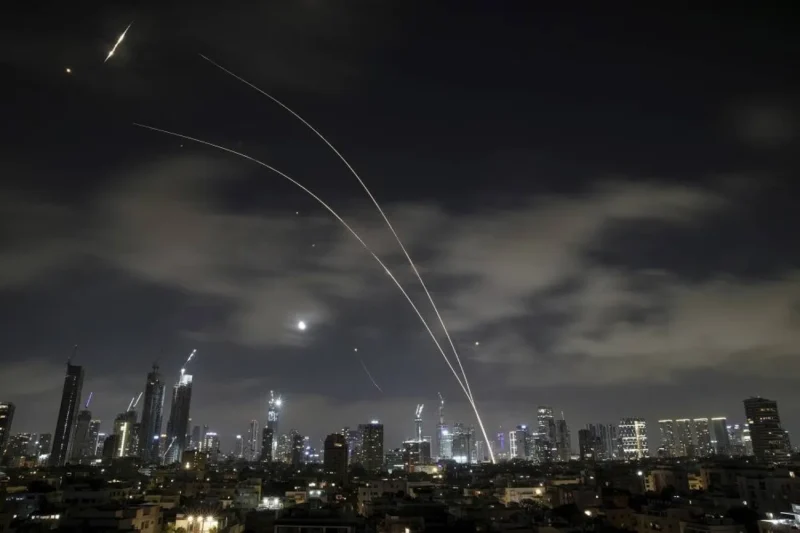
Saudi Defense Ministry Reports Minor Damage After Two Hostile UAVs Target Diplomatic Compound.
The war’s ripple effect reaches Riyadh. How far will the escalation spread?
Saudi Arabia confirmed Tuesday that the US Embassy in Riyadh was targeted by two hostile drones, underscoring the widening fallout from the escalating U.S.-Israeli conflict with Iran.
Major General Turki Al-Maliki, spokesperson for the Saudi Ministry of Defense, said initial assessments indicate the drones caused a limited fire and minor material damage to part of the embassy compound. No casualties were immediately reported.
The incident was carried by the Saudi Press Agency, which described the damage as contained. Saudi authorities did not immediately attribute responsibility.
The attack comes amid heightened tensions across the Gulf following joint U.S.-Israeli strikes on Iran that killed senior Iranian officials, including Supreme Leader Ali Khamenei. In response, Iran and allied groups have launched missile and drone attacks across multiple countries hosting U.S. assets.
In a security alert, the U.S. mission urged American citizens in Riyadh, as well as in Jeddah and Dhahran, to shelter in place. The advisory reflects growing concern that diplomatic and military sites across the region may face further threats.
Several Gulf cities have already experienced collateral damage from intercepted projectiles and falling debris as air defense systems respond to incoming threats. The targeting of a major diplomatic compound in the Saudi capital marks another escalation in a conflict that is increasingly spilling beyond its original battlefield.
Saudi Arabia has previously condemned attacks on its territory and signaled that it reserves the right to respond to threats against its security. For now, authorities appear focused on containment.
The broader concern is strategic: as drones and missiles widen the geography of risk, even cities long considered insulated from frontline conflict are being drawn into the confrontation.
Middle East
Netanyahu: Iran Conflict Won’t Be “Endless War”

Israeli Prime Minister Defends Joint Strikes, Says Action Was Needed Before Iran’s Nuclear Sites Became Untouchable.
“Quick and decisive,” Netanyahu says. But how short is short in the Middle East?
Israeli Prime Minister Benjamin Netanyahu insists the expanding confrontation with Iran will not become an open-ended war, even as regional tensions intensify following joint U.S.-Israeli strikes.
In an interview with Fox News broadcast Monday, Netanyahu described the campaign as necessary and time-sensitive, arguing that Israel and the United States had acted before Iran’s nuclear infrastructure became effectively immune to attack.
“You’re not going to have an endless war,” Netanyahu said. “This is going to be a quick and decisive action.” He later acknowledged the operation “may take some time,” but added that it would not stretch into years.
Netanyahu’s central claim rests on intelligence assessments that Iran had begun constructing new underground nuclear and missile facilities following the brief but intense 12-day conflict in June, when coordinated U.S. and Israeli strikes targeted Iranian assets.
According to Netanyahu, those new sites — including hardened bunkers — would soon have placed Tehran’s ballistic missile and nuclear programs beyond reach. “If no action was taken now, no action could be taken in the future,” he said.
Iran has consistently denied pursuing nuclear weapons, maintaining that its program is for civilian energy purposes. However, Israeli leaders have long argued that enrichment capabilities and missile development together create a credible weapons pathway.
The remarks come as U.S. President Donald Trump has offered shifting timelines for the duration of hostilities. Trump recently suggested the war could continue for more than four weeks, reflecting uncertainty about how Iran and its regional allies may respond.
Military exchanges have already widened beyond Iranian territory, with retaliatory missile and drone attacks affecting Gulf states and disrupting airspace and shipping lanes.
Netanyahu’s insistence on a finite campaign appears aimed at reassuring both Israeli citizens and international partners wary of another protracted regional war. Yet conflicts in the Middle East have repeatedly defied early predictions.
Whether this operation remains contained — or evolves into a broader confrontation — will depend largely on Tehran’s next moves and Washington’s appetite for escalation.
For now, Israeli leadership is framing the campaign not as a long war of attrition, but as a preemptive strike designed to close what it sees as a narrowing strategic window.
Middle East
Oil Surges, Gas Soars as Gulf War Threatens Global Energy Arteries
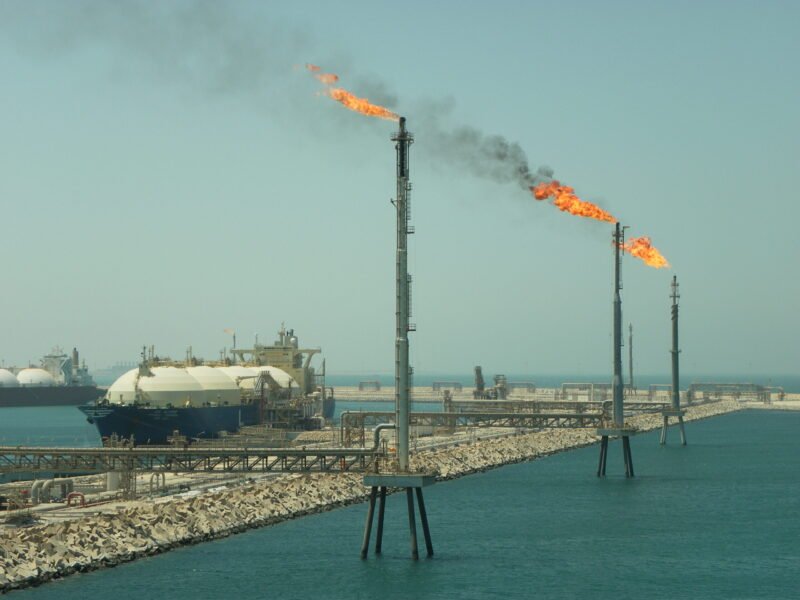
Strait of Hormuz Tensions and LNG Shutdown in Qatar Send Shockwaves Through Markets.
Missiles in the Gulf. Tankers at anchor. Is the world on the brink of an energy shock?
Energy markets jolted sharply higher as the widening conflict between Iran, the United States and Israel began to threaten critical oil and gas infrastructure across the Gulf.
Global benchmark Brent crude briefly climbed to $82 a barrel on Monday after reports that at least three vessels were attacked near the Strait of Hormuz — the narrow waterway through which roughly 20 percent of the world’s oil and gas flows. Iran warned ships against transiting the strait, deepening fears of a supply choke point.
Natural gas markets reacted even more dramatically. Europe’s benchmark gas price surged as much as 50 percent before closing 39 percent higher after QatarEnergy halted liquefied natural gas production following drone strikes on facilities in Ras Laffan Industrial City. Qatar’s defense ministry said the damage was contained, but the suspension rattled traders.
In neighboring Saudi Arabia, Saudi Aramco temporarily shut its Ras Tanura refinery after a drone strike, further tightening concerns about regional output.
Shipping disruptions compounded the volatility. The UK Maritime Trade Operations reported multiple security incidents in the Arabian Gulf and Gulf of Oman. At least 150 tankers dropped anchor outside the Strait of Hormuz, while major operators rerouted vessels to avoid exposure. Danish shipping giant Maersk paused sailings through the Bab el-Mandeb Strait and Suez Canal, diverting around Africa’s Cape of Good Hope.
Equity markets reflected the uncertainty. London’s FTSE 100 fell 1.2 percent, led lower by airlines and banks exposed to energy-sensitive sectors. France’s CAC-40 and Germany’s DAX posted steeper declines. In the United States, the S&P 500 and Nasdaq initially fell but later recovered to close modestly higher.
Analysts cautioned that markets are not yet in crisis mode. “The market isn’t panicking,” said Saul Kavonic of MST Marquee, noting that major oil infrastructure has not been comprehensively disabled. Others warned, however, that a prolonged conflict could push crude above $100 a barrel, feeding global inflation.
Economists say sustained energy price spikes would quickly filter into food, industrial commodities and transport costs. Central banks, including the Bank of England, could be forced to delay planned interest-rate cuts if inflation pressures intensify.
For now, the Strait of Hormuz remains the focal point. As long as tankers hesitate and production remains uncertain, volatility is likely to persist — a reminder that even limited regional conflict can ripple across the global economy within hours.
Middle East
Middle East War Expands Across Borders
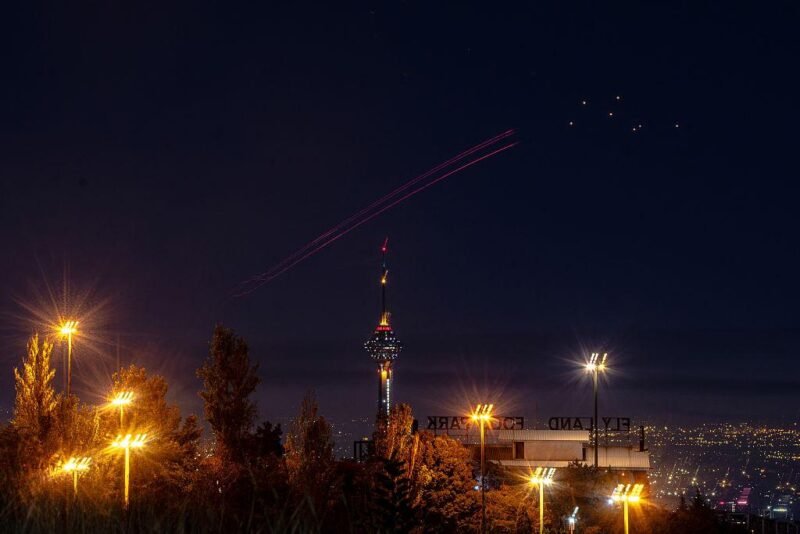
Missiles Over Capitals: Strikes Hit Tehran, Beirut and Gulf Cities as US and Israel Face Wider Retaliation.
Four days in — and the war is no longer confined to one battlefield.
The conflict triggered by joint U.S.-Israeli strikes on Iran has entered its fourth day with no sign of containment, as new attacks ripple across the region from Tehran to Beirut and the Gulf.
Explosions in Iran
Loud blasts were reported overnight in northern Tehran, with additional explosions in Karaj and Isfahan. Iranian media did not immediately specify targets. Israel’s military said it was conducting simultaneous strikes in Tehran and Beirut, underscoring the widening operational scope.
An Israeli statement also claimed it had struck and “dismantled” facilities linked to Islamic Republic of Iran Broadcasting (IRIB), though Iranian outlets reported continued operations despite nearby explosions.
The U.S.-based Human Rights Activists News Agency (HRANA) reported more than 100 casualties inside Iran on the third day of fighting, including civilians and military personnel. Independent verification remains difficult.
Lebanon and Hezbollah
Israel confirmed new deployments in southern Lebanon, describing the move as “forward defence” along the border. Strikes targeted positions associated with Hezbollah in Beirut, including alleged command centers and weapons storage facilities.
Hezbollah responded by firing rockets and drones at Israeli military bases, calling the action defensive. Israel’s defense minister said the military would take control of additional positions if necessary.
Gulf States Under Pressure
The war’s spillover has intensified in the Gulf.
Two drones struck the US Embassy in Riyadh, causing limited damage, according to Saudi officials. The embassy closed temporarily and urged Americans to avoid the area.
In Kuwait, the US Embassy in Kuwait announced an indefinite closure after Iranian attacks. Qatar reported intercepting ballistic missiles over Doha, while Oman confirmed a drone strike on a port facility that hit a fuel tank without causing casualties.
Strait of Hormuz Warning
China urged all parties to ensure safe navigation in the Strait of Hormuz, a chokepoint through which roughly a fifth of global oil shipments pass. An Iranian Revolutionary Guards general threatened to target shipping and oil infrastructure, warning that prices could surge sharply.
Such threats heighten fears of global economic disruption.
Washington and Jerusalem Signal Resolve
U.S. President Donald Trump said retaliation for attacks on American facilities would come “soon,” while also signaling the campaign could extend beyond earlier projections.
Secretary of State Marco Rubio said Washington acted preemptively after learning Israel planned strikes, arguing that failure to act would have resulted in greater U.S. casualties.
Israeli Prime Minister Benjamin Netanyahu insisted the operation would not become an “endless war,” though he acknowledged it may take time.
Meanwhile, the U.S. State Department urged Americans to depart numerous Middle Eastern countries, citing serious safety risks.
As missiles cross borders and diplomatic compounds close, the conflict’s geography continues to expand. The question now is whether diplomatic channels can re-emerge — or whether the region is bracing for a longer, more volatile phase of confrontation.
-

 Somaliland1 month ago
Somaliland1 month agoF-35s Over Hargeisa: The Night Somaliland’s Sovereignty Went Supersonic
-

 Somalia2 months ago
Somalia2 months agoAid Destroyed, Trust Shattered: Somalia Loses U.S. Support for Good
-

 Terrorism2 months ago
Terrorism2 months agoForeign ISIS Pipeline Exposed: Puntland Captures Dozens of Non-Somali Fighters
-

 Somaliland1 month ago
Somaliland1 month agoSomaliland at Davos: The Moment Somaliland Entered the World’s Inner Circle
-

 Terrorism1 month ago
Terrorism1 month agoAmerica Pulls Back From Somalia but Doubles Down Next Door
-

 Top stories2 months ago
Top stories2 months agoSomali Pirates Hijack Chinese Fishing Vessel off Puntland Coast
-

 Opinion2 months ago
Opinion2 months agoTurkey’s Selective Morality: From the Ruins of Gaza to the Red Sea
-

 Middle East2 months ago
Middle East2 months agoUS War Plans Against Iran Enter Advanced Stage






